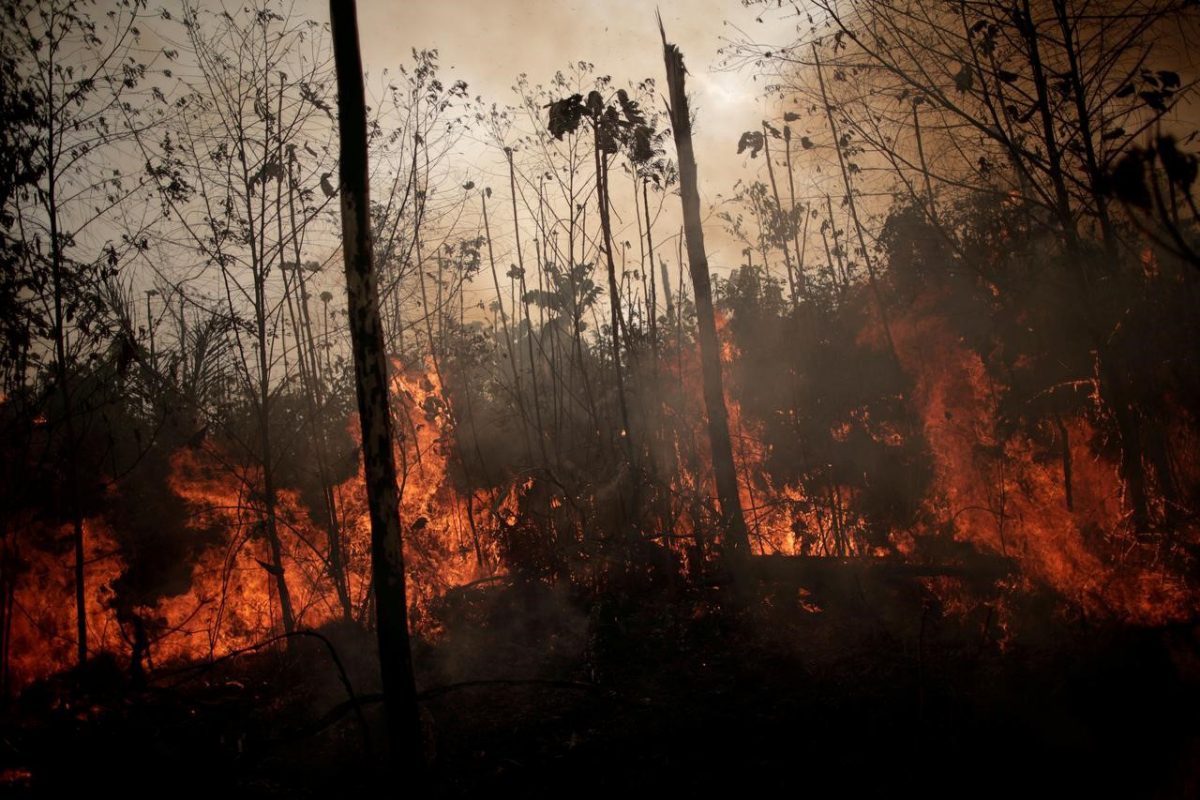BRASILIA, (Reuters) – Seven major European investment firms told Reuters they will divest from beef producers, grains traders and even government bonds in Brazil if they do not see progress in resolving the surging destruction of the Amazon rainforest.
The rising threats from investors with more than $2 trillion in assets under management, including Finland-based Nordea and the UK’s Legal & General Investment Management (LGIM), show how the private sector is taking global action to protect the world’s largest rainforest.
Brazil’s President Jair Bolsonaro has shrugged off diplomatic pressure on the matter.
Deforestation of Brazil’s Amazon surged to an 11-year high in 2019, Bolsonaro’s first year in office, and has risen a further 34% in the first five months of 2020, according to preliminary data from government space research agency INPE. The right-wing populist has weakened environmental protections and called for more mining and farming in the Amazon region.
“The trends we’ve seen in Brazil are very concerning,” said Daniela da Costa-Bulthuis, Brazil portfolio manager for Netherlands-based asset manager Robeco. “You have a dismantling of the regulatory mechanisms of environmental control since last year.”
Bolsonaro’s press office declined to comment on the investors’ concerns. He defended Brazil’s environmental record against criticism from world leaders last year as destructive fires in the Amazon drew global outcry. So far, corporate pressure has proven more effective in turning Brasilia’s attention to the environment.
A bill originally proposed by Bolsonaro to grant property deeds for irregularly settled public land, a measure seen encouraging deforestation, failed to reach a vote in May and is now delayed indefinitely after more than 40 mostly European companies threatened to boycott Brazilian exports.
In September, 230 institutional investors signed a letter calling for urgent action to combat the fires surging in the Amazon rainforest, capturing global attention.
However, the seven asset management firms that spoke to Reuters – Storebrand, AP7, KLP, DNB Asset Management, Robeco, Nordea Asset Management and LGIM – went further in laying out the threat of divestment if there is not progress. The firms hold over $5 billion in investments linked to Brazil, including global grains traders with major operations in the country.
Norway’s largest pension fund KLP said it was engaging with trading firms Archer Daniels Midland (ADM), Cargill and Bunge and judging if their environmental policies are adequate.
“If our conclusion is negative, divestment can be the likely result, potentially as soon as this year and we’d expect such a move to trigger other larger investors to follow our lead,” said Jeanett Bergan, KLP’s head of responsible investment, via email.
In response to questions on divestment, Bunge and Cargill described a range of efforts to root out deforestation from their supply chains, citing their adherence to the “Amazon Soy Moratorium.”
In that voluntary agreement, major trading firms including Cargill, Bunge and ADM pledged not to buy soy from parts of the Amazon deforested since 2008.
ADM did not respond to request for comment.
Norwegian insurance and pension provider Storebrand and Sweden’s largest national pension fund AP7 also said they could divest from ADM and Bunge if the companies do not take adequate measures to combat deforestation.
Norway’s DNB Asset Management AS said index funds it manages, which include holdings in Bunge, could exclude companies that fail to meet its sustainability standards.
Other investment firms mentioned concerns related to Brazilian meatpackers, which have drawn scrutiny in the past for sourcing beef from deforested areas of the Amazon.
LGIM is pushing Brazilian companies, including the world’s largest meatpacker, JBS, and smaller rivals Marfrig and Minerva for “robust climate targets and land-use policies, with inaction potentially leading to voting sanctions and targeted divestments,” said Yasmine Svan, senior sustainability analyst at LGIM, in an emailed statement.
JBS, Minerva and Marfrig said in separate statements they are committed to eliminating Amazon deforestation from their supply chains and detailed their efforts.
The asset management arm of Nordea, one of the Nordic countries’ biggest banks, halted purchases of Brazilian sovereign debt last year after forest fires flared, putting its roughly 100 million euros ($112 million) of Brazilian government bonds in “quarantine.”
Thede Ruest, head of emerging-market debt at Nordea Asset Management, said the firm could go further.
“The next level of escalation from quarantining actually means selling our Brazil government bonds, which could trigger other funds following suit,” Ruest said. “We are disappointed by the lack of progress by the current administration, with deforestation rates continuing to soar ahead of another major fire season.”
Da Costa-Bulthuis of Robeco, which manages at least 3 billion euros in Brazilian equities and up to 5 billion euros when including debt and other assets, declined to comment on specific holdings.
But she said the firm could reduce its exposure to Brazil if its environmental record deteriorates further.
Da Costa-Bulthuis, along with LGIM’s Svan and Nordea’s Ruest, expressed alarm about a recent video of a Brazilian cabinet meeting, made public due to a federal investigation.
In the recording, Environment Minister Ricardo Salles suggested to Bolsonaro and other ministers that the government should accelerate environmental deregulation while the public is distracted by the current coronavirus pandemic.
“He’s working against the environment. What he said was unacceptable,” da Costa-Bulthuis said. “If they (the government) will be sensible or not, I think one way to start would be to change the environment minister because this guy does not have credibility.”
Salles and his press office did not respond to requests for comment on the statement. At the time, the minister said he was only calling for cutting unhelpful bureaucracy that hinders investment.
Bolsonaro dispatched the military last month to combat destruction of the Amazon, although deforestation rose again in May compared to a year earlier for the 13th straight month.
Da Costa-Bulthuis said that the deployment was “the minimum” the government could do and not an adequate replacement for strengthening agencies specialized in environmental enforcement.
“We don’t think they’re doing enough.”

